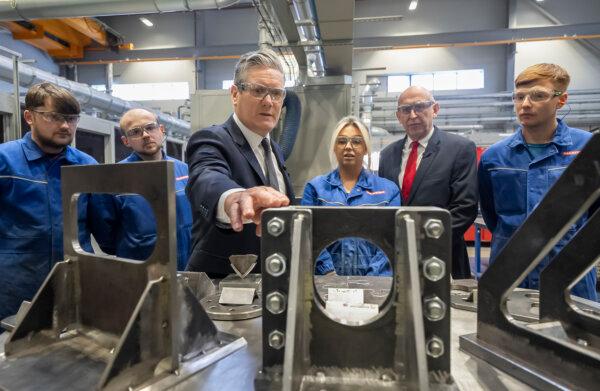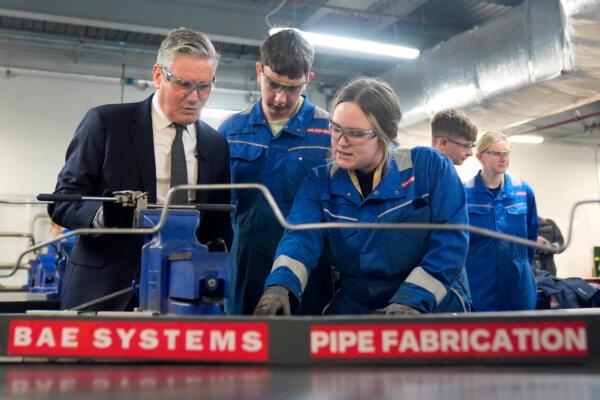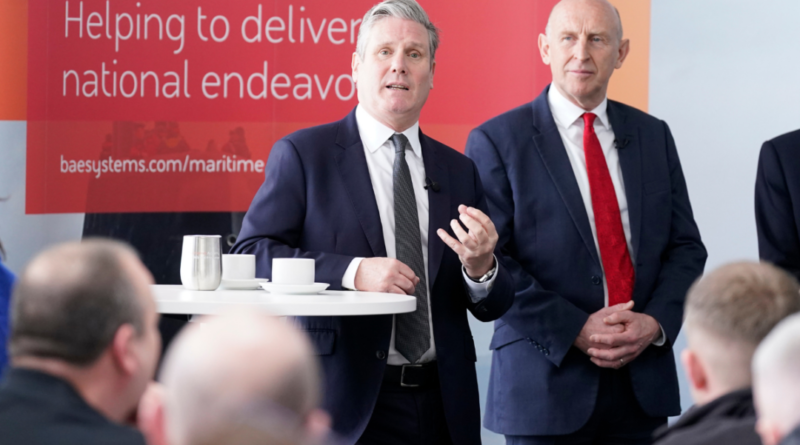Starmer Affirms Labour’s Commitment to Nuclear Deterrent
Sir Keir Starmer’s dedication to NATO, defence spending, and Trident represents a departure from his predecessor Jeremy Corbyn, who has long been a supporter of nuclear disarmament.
Sir Keir Starmer has promised that if Labour wins the next election, the party will continue to support the UK’s nuclear deterrent, Trident.
“My commitment to NATO and the UK’s nuclear deterrent – maintained on behalf of NATO allies – is unshakeable. Absolute. Total,” he declared, underscoring that the “changed” Labour Party he leads prioritizes national security above all.
Sir Keir’s stance marks a shift for Labour from the Jeremy Corbyn era. Mr. Corbyn, now an independent MP, has been closely associated with the Campaign for Nuclear Disarmament since his youth and serves as the group’s vice president.
The Labour leader unveiled his post-Corbyn defense strategy before visiting the BAE Systems shipyard in Barrow-in-Furness, Cumbria, where he engaged with workers, union members, and apprentices.
Nuclear Deterrent the ‘Bedrock’ of UK’s Defence
Sir Keir assured that under a Labour government, a “nuclear deterrent triple lock” will form the cornerstone of their plan to safeguard Britain. He also committed to defense investment that prioritizes “British jobs first.”
BAE Systems is constructing the Dreadnought Class Royal Navy nuclear submarines, set to replace the Vanguard Class by the early 2030s at an estimated cost of £31 billion.
Labour, under Sir Keir, will also uphold the continuous at-sea nuclear deterrent. If elected, a Starmer government will take a proactive role within AUKUS, an Indo-Pacific security partnership comprising the US, Australia, and the UK.
“We unequivocally stand by our commitment to NATO,” he affirmed.
Defence Secretary Grant Shapps has similarly committed to increasing defense spending to 2.5 percent under a Conservative government.
On Friday, Mr. Shapps criticized Sir Keir and shadow defense minister John Healey for attempting to put Jeremy Corbyn in charge of the nation’s armed forces on two occasions.
Mr. Shapps remarked, “The same man who wanted to scrap our nuclear deterrent, dismantle NATO, and questioned the integrity of the British Intelligence community.
“Labour’s shadow foreign secretary repeatedly voted to eliminate Trident. They are not the party we can trust with our nation’s defenses.”
UK to Conduct Military Exercises with Japan
In addition to collaborating within AUKUS to enhance regional security, the Ministry of Defence announced its plan to conduct routine trilateral military exercises in the Indo-Pacific with Japan and the US.

The three nations aim to enhance the interoperability of their armed forces through these exercises, beginning in 2025.
Mr. Shapps asserted that these maneuvers will send a strong message to aggressors looking to challenge the rules-based international order.
“In an increasingly unpredictable world where peace cannot be taken for granted, it is crucial to stand in unity with our allies and partners to defend democracy and freedom,” he stated.
He added, “A secure and stable Indo-Pacific region is essential for our collective security, enabling free trade and travel, and our strong partnerships with Japan and the US further underline our commitment to the area.”

The defense secretary revealed that the Royal Navy aircraft carrier HMS Prince of Wales will lead a Carrier Strike Group to the Indo-Pacific, conducting operations and exercises with partners and allies, including a port visit to Japan.
Steadfast Defender, ongoing from January to May 31, showcases NATO’s military capabilities and unity in the face of evolving security threats.
Approximately 90,000 troops from all NATO members are participating in multi-domain exercises across land, air, sea, cyber, and space in a dozen European countries.
PA Media contributed to this report.





